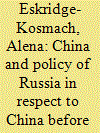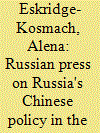| Srl | Item |
| 1 |
ID:
106458


|
|
|
|
|
| Publication |
2011.
|
| Summary/Abstract |
The article is devoted to an analysis of the attitudes of the Russian society towards China as expressed in the Russian press - from the very first pieces of information published in the Russian press about China to the beginning of the Chinese-Japanese War. The Russian press of different political directions did not have definite and precise opinions concerning Russian policy towards China at the beginning and in the middle of the 19th century. Russian journalists, researchers and philosophers began to discuss different aspects of Chinese development and in their publications were expressed the attitudes of the ruling Russian elite, which began to express interest in an active Far Eastern Russian foreign policy.
|
|
|
|
|
|
|
|
|
|
|
|
|
|
|
|
| 2 |
ID:
135929


|
|
|
|
|
| Summary/Abstract |
The active movement of the Russian Empire to the East for three centuries and its colossal success led to the need for some Russian thinkers and publicists to analyze this unique phenomenon as part of the general European colonial ‘movement’ to the East. The problem became more relevant than ever after the Sino-Japanese war (1894–1895), when the expansion of Russia to the East intensified, and all the world powers started to formulate their interests in China. Conflicts with and around China among these countries became widespread. Here the Russian press played a great role, accompanying and commenting on each step made by Russian diplomats and military. The discussions gradually highlighted two different problems. These were the ideas of ‘yellow peril’ and ‘Russia’s special mission in the East’.
|
|
|
|
|
|
|
|
|
|
|
|
|
|
|
|
| 3 |
ID:
121015


|
|
|
|
|
| Publication |
2012.
|
| Summary/Abstract |
The article is devoted to the changes in the analysis in contemporary Russian press of the approaches towards Russian policy in the Far East in connection with the events of the Chinese-Japanese War in the mid-1890s, when the focus of the international contradictions shifted to the Far East. All of these real and presumed events began to attract more attention from Russian society and the Russian press. The fact of the Chinese defeat in the war against Japan made the Russian press of all political persuasions reconsider and reform their points of view with respect to China and the Far East in general.
|
|
|
|
|
|
|
|
|
|
|
|
|
|
|
|
| 4 |
ID:
147813


|
|
|
|
|
| Summary/Abstract |
The article is devoted to an analysis of the attitudes of the different social groups of Russian society toward the Russian-Turkish war of 1877–1878. The author based her analysis on the memoirs, diaries, and epistolary heritage of contemporaries. The author reveals the attitudes of Russian society on the eve of and during the war. The author emphasizes the support of the war by the Russian peasants and the common people, who expressed their deepest sympathy to the suffering of the South Slavs under the Turks, as their brothers in faith. The author gives the analysis of the attitudes of the Russian nobility and the clergy toward the events in the Balkans. According to the author, the attitude of the nobility was controversial and also included personal motivations. The author reveals the opinions of contemporaries, which differ from the views of some modern historians who base their assessments on the statements of the members of the volunteer movements and data from police reports. On the other hand, one can suppose that for the majority of Russian volunteers in the Balkans, personal gain was quite compatible with a sincere desire to help Slavs as brothers in blood and most likely, as suffering fellow believers.
|
|
|
|
|
|
|
|
|
|
|
|
|
|
|
|